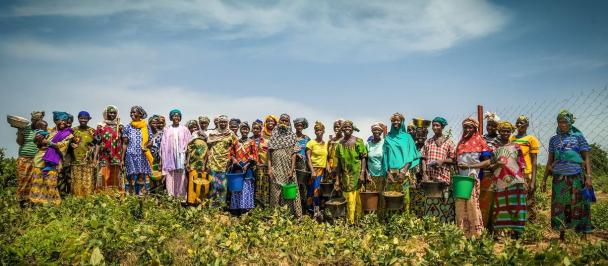Remarks at UNGA side event: “Friends of the United Nations Inter-Agency Task Force on the Prevention and Control of Non-communicable Diseases (NCDs): Supporting Member States to achieve the NCD-related Sustainable Development Goals targets”
Supporting Member States to achieve the NCD-related Sustainable Development Goals targets
September 27, 2018
As prepared for delivery.
Thank you to the Russian Federation and WHO for organizing this event. I first want to congratulate you all on your commitments and progress to date. Your efforts inspire countries around the world that they can make meaningful progress.
We must build on these efforts and good practices to accelerate the global NCD response. As you know, 15 million people still die from NCDs each year between the ages of 30 and 69, with 85 percent of these premature deaths occurring in low- and middle-income countries . Yet almost 10 million premature deaths can be avoided by 2025 if the policies and interventions endorsed by the World Health Assembly are implemented.
I am both nervous and encouraged about the state of the NCD response. I am nervous because there remains an enormous mismatch between the scale of the problem and the current response. But I am encouraged because the blueprint has become stronger. The NCD agenda now includes increased attention to air pollution and universal health coverage. Both of these are important for achieving sustainable development. They require complex and integrated partnership efforts, with development actors working closer than ever with health actors, the private sector and others. Such partnerships are hard work but pay off. We must also increase investment in prevention. By doing so we can turn off the tap and deliver gains on not just the NCD agenda but across multiple SDGs.
As the majority of these measures require the meaningful engagement of sectors beyond health, UNDP works closely with WHO and other members of the UN Interagency Task Force to strengthen national capacities to respond, enable leadership, and support the governance, planning and prioritization of responses.
The 2030 Agenda reflects and responds to the interconnectedness of health and development. Good health is a driver, indicator and contributor to sustainable development. Enhanced collective multi-sectoral action will not only avoid early death and widespread human suffering but also drive many development gains across a range of SDGs. For example:
SDG 1 on poverty eradication: each year 100 million people are driven into extreme poverty due to out-of-pocket health expenditures. The chronic nature of NCDs, the type of services required, and gaps in treatment access often make NCD-related health expenditures ‘catastrophic’.
SDG 8 on decent work and economic growth: between 2011 and 2030, NCDs are projected to cost LMICs USD 21.3 trillion in health care costs and lost productive capacities.
SDG 13 on climate action: Globally, in 2012, one in four deaths (12.6 million) resulted from an unhealthy environment. Pollution alone causes 9 million deaths from NCDs each year – with most of these in LMICs.
ECOSOC recognises the importance of the NCD agenda to sustainable development, noting that the Task Force contributes to progress on 30 SDG targets spanning 12 SDGs. We must make the most of this opportunity.
Through the UNDP and WHO joint programme on NCD governance, we are supporting national investment cases for NCD prevention and control, recognizing the importance of aligning incentives across sectors. These cases define the costs of inaction against the costs avoided through targeted policy actions in a whole-of-government response. With the Russian Federation’s support, we are assisting 11 low- and middle-income countries to develop NCD investment cases, jump-starting NCD responses. Through the investment cases, we are seeing that some countries are losing over 5 percent of GDP each year due to NCDs. These cases are facilitating expanded fiscal space for better NCD prevention, treatment and care, as well as supportive legislation and policies.
UNDP welcomes Dr Tedros’ prioritization of universal health coverage (UHC) and is glad to be collaborating on this agenda in line with the MoU our respective agencies signed. UHC is fundamental to poverty eradication, and it necessitates the removal of legal and systemic obstructions to service access, most importantly for the marginalized and excluded.
UNDP encourages and supports integrated disease responses. This can drive synergies and efficiencies both within and beyond the health sector. This week, with the HLM on TB yesterday and the NCD HLM today, UNDP and the Secretariat of the WHO FCTC have launched guidance on integrated responses to tobacco cessation, HIV and TB. The NCD response must continue to learn from the HIV response, not least in whole-of-society mobilization and chronic disease management. We continue to value our partnership with the Joint UN Programme on HIV/AIDS.
I want to leave you with a sobering reminder that, despite our ambitious pledges and commitments, the NCD response remains chronically underfunded. Two percent of development assistance for health is addressing 60 percent of the overall disease burden. We need to help countries address this mismatch. ECOSOC has recognized that its requests of the task force to support Member States cannot be fulfilled with current resources. Indeed, I fear that without scaled up partnerships and new catalytic funding, “time to deliver” risks becoming just another slogan.
Conversely, an accelerated NCD prevention, treatment and care response, with all of its inherent challenges and opportunities, could be a flagship example of integrated, multi-stakeholder support to Member States in the SDG era.

 Locations
Locations




